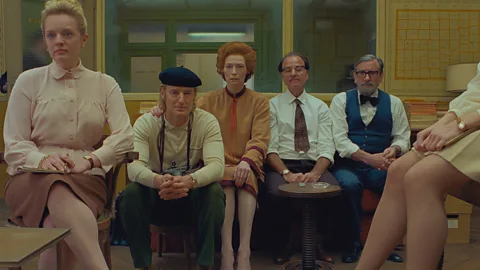The French Dispatch: Four stars for Wes Anderson's latest
 20th Century Studios and TFD Productions
20th Century Studios and TFD ProductionsThe long-awaited new film from the eccentric US director – featuring three "breezy, cheeky vignettes" – is arch, whimsical and everything you'd expect from him, writes Nicholas Barber.
When you're watching a Wes Anderson film, you know it. Within seconds, you spot the symmetrical compositions, the horizontal camera moves, the blocks of garish colour, the sans-serif lettering, the arch, wordy, vaguely melancholy humour and all the other elements that distinguish his comedies from everyone else's. You probably know, too, whether you love his work or hate it. Well, The French Dispatch isn't going to change your mind. His long-awaited portmanteau, which premiered in Cannes on Monday, is the most Anderson of all Anderson films. It's Anderson distilled, Anderson squared, Anderson to the nth degree. Some viewers will watch it 100 times, and spot new little details every time. Other viewers will walk out or switch off in a matter of minutes.
The film is an anthology of three whimsical short stories set in France in the mid-20th Century. The conceit is that they were all published in an English-language magazine which is edited in the punningly-named fictional French city of Ennui-sur-Blasé, but which is attached to an American newspaper based in Kansas. First we meet the dedicated, eccentric editor, played by Bill Murray (who else?), and staff members played by Elisabeth Moss and Jason Schwartzman (one of three writers who helped Anderson with the plotting). Then we are given a guided tour of the city by a cycling, beret-wearing Owen Wilson. And then the three main stories begin.
The first is the raucous tale of a violent, bushy-bearded psychopath (Benicio del Toro) who happens to be a great artist. While he is behind bars, he paints abstract portraits of the unsmiling warden (Léa Seydoux) he loves. A smooth-talking art dealer (Adrien Brody) believes he has found the future of art, but it isn't easy to foster the career of someone in a high-security prison. The second story – the least satisfying of the three – is an account of a student radical (Timothée Chalamet) and the journalist (Frances McDormand) who ghost-writes his revolutionary manifesto. And the third is a rollicking crime caper in which the son of a police chief (Mathieu Amalric) is kidnapped by a gangster (Edward Norton).
It's not these outlines that count, though, so much as the painstaking ways in which they are filled in. The French Dispatch has to be one of the most labour-intensive films in existence. It makes The Grand Budapest Hotel look as if it was improvised over a weekend and shot with a smartphone. Not a scene goes by that hasn't been ornamented with a split screen, a freeze frame, a caption, a voice-over, a switch between monochrome and colour, or a change of the aspect radio. A section will suddenly become a stage play, a comic-strip-style cartoon, a chat-show anecdote, or a lecture delivered in glorious style by Tilda Swinton in a shocking orange dress and a wig to match.
Adam Stockhausen's doll's-house production design is eye-wateringly precise, the black-and-white images of the city's ancient buildings (shot in Angouleme) deserve their own coffee table book, Alexandre Desplat's music keeps ticking and twinkling away, and the florid prose is so elaborate that the characters aren't hungry, they're "in a dire condition of calorific depletion". Even the cast is heightened, so that the tiniest blink-and-you'll miss-it role is played by the likes of Willem Dafoe, Saoirse Ronan and Henry Winkler. The French Dispatch is exhausting enough to watch, so I can't imagine how demanding it must have been to make.
There were moments when I doubted whether it was worth all the effort – whether it was crazy of Anderson to toil so obsessively over three breezy, cheeky vignettes which are neither sidesplittingly hilarious nor heart-wrenchingly insightful. The film is both a tip of the chapeau to The New Yorker, among other American magazines, and a love letter to expat life in France. But beyond that? There isn't much going on beneath its extraordinary bejewelled surface. The film is – to use a French term – a jeu d'esprit with no depth to its characters or edge to its satire.
But there is something delightfully perverse about Anderson's hyper-industrious treatment of such flimsy material. His craftsmanship is so overwhelming that unless you're already allergic to his tics and trademarks, you should get a buzz from the film's many, many incidental pleasures. One thing's for sure: there is nothing quite like The French Dispatch – except Anderson's other films, of course.
★★★★☆
Love film and TV? Join BBC Culture Film and TV Club on Facebook, a community for cinephiles all over the world.
If you would like to comment on this story or anything else you have seen on BBC Culture, head over to our Facebook page or message us on Twitter.
And if you liked this story, sign up for the weekly bbc.com features newsletter, called The Essential List. A handpicked selection of stories from BBC Future, Culture, Worklife and Travel, delivered to your inbox every Friday.
